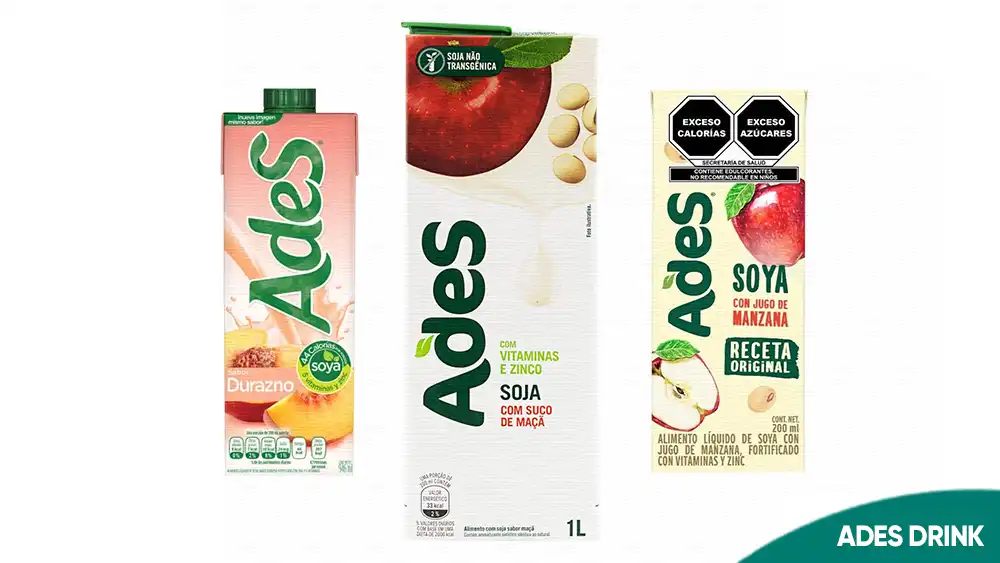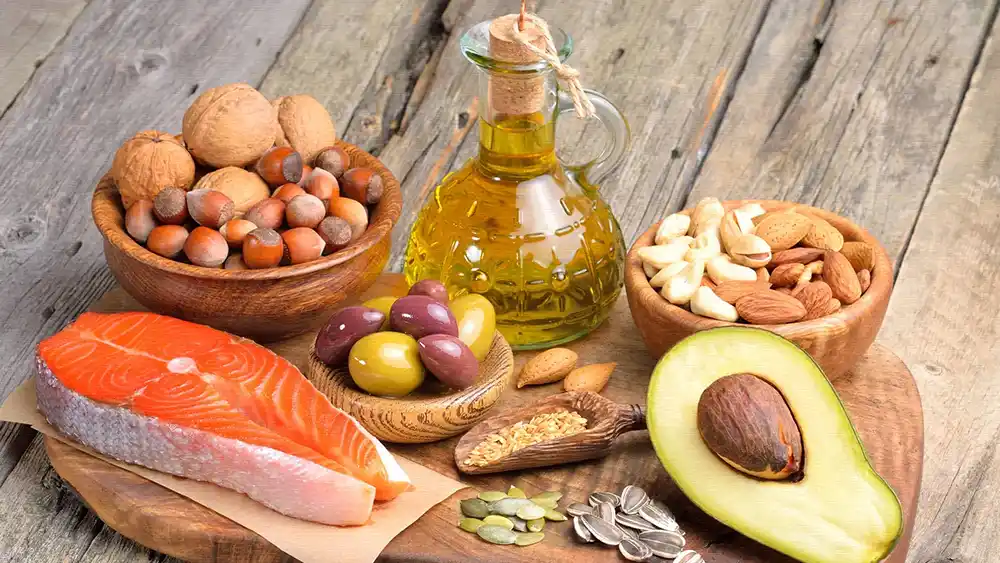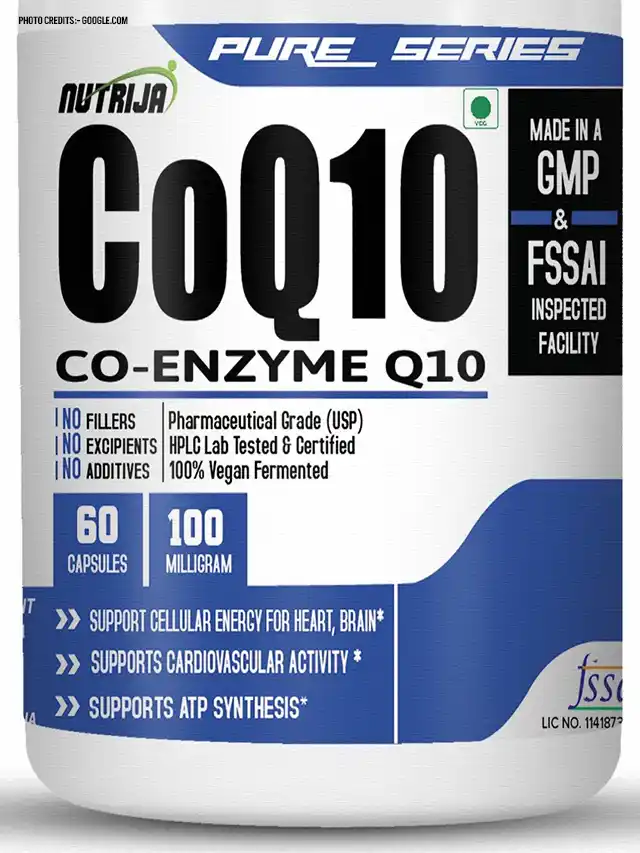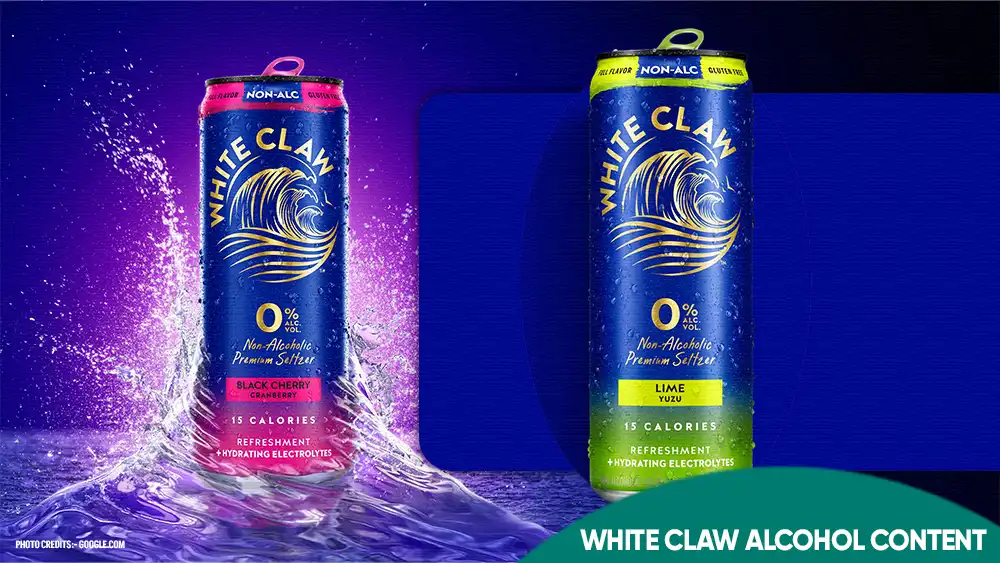
HEALTH BLOG
What is Coenzyme Q10 (CoQ10): Their Crucial Role to Our Health
-
 Rahul Priydarss
Rahul Priydarss - April 28, 2024
Discover the essential role of Coenzyme Q10 (CoQ10) in cellular energy production and antioxidant defense. Explore its benefits for heart health, exercise performance, and skincare. Learn about natural food sources, top supplement brands, and factors influencing CoQ10 levels. Find answers to FAQs and understand potential side effects and interactions. Unlock the power of CoQ10 for optimal health and vitality.
Introduction to Coenzyme Q10:
Coenzyme Q10, often called CoQ10, is a vital compound found in every cell of the human body. It plays a crucial role in producing energy and serves as a powerful antioxidant, protecting cells from damage caused by harmful molecules known as free radicals.
What is Coenzyme Q10?:
Coenzyme Q10, often abbreviated as CoQ10, is a compound that your body produces naturally. It’s found in every cell and plays a crucial role in producing energy for your cells. CoQ10 also acts as an antioxidant, which means it helps protect your cells from damage caused by harmful molecules called free radicals.
This compound is particularly important for the health of your heart, kidneys, and liver, as these organs have high energy requirements. CoQ10 levels may decrease with age or due to certain medical conditions, so some people take CoQ10 supplements to support their overall health and energy levels. Additionally, CoQ10 is sometimes used as a supplement to support heart health and to mitigate the side effects of certain medications.

Table of Contents
Importance of CoQ10 in the body:
CoQ10 is essential for properly functioning cells and organs, especially those with high energy demands such as the heart, liver, and kidneys. It also acts as a potent antioxidant, neutralizing free radicals and reducing oxidative stress, linked to various chronic diseases and aging. Coenzyme Q10 (CoQ10) plays several important roles in the body.
Energy Production: CoQ10 is essential for the production of adenosine triphosphate (ATP), which is the primary source of energy for cells. It’s particularly important for organs with high energy demands, like the heart, kidneys, and liver.
Antioxidant Protection: CoQ10 acts as an antioxidant, helping to neutralize harmful free radicals that can damage cells and DNA. This antioxidant activity helps protect cells from oxidative stress and supports overall cellular health.
Heart Health: CoQ10 is concentrated in the heart muscle and is crucial for maintaining cardiovascular health. It supports heart function by providing energy for contraction, protecting against oxidative damage, and promoting healthy blood vessel function.
Mitochondrial Function: CoQ10 is a key component of the mitochondrial electron transport chain, where it helps generate ATP, the energy currency of the cell. Healthy mitochondrial function is essential for overall cellular health and energy production.
Supports Exercise Performance: Some research suggests that CoQ10 supplementation may improve exercise performance by enhancing energy production and reducing oxidative stress during physical activity.
Age-related Decline: CoQ10 levels naturally decrease with age, and this decline may contribute to age-related health issues. Supplementing with CoQ10 may help support energy levels and overall health in older adults.
Natural Food Sources of Coenzyme Q10:
Coenzyme Q10 (CoQ10) is found in various natural food sources, though in relatively small amounts. Here are some foods that contain CoQ10.
Organ meats: The liver, kidney, and heart are rich sources of CoQ10. Beef, pork, and chicken liver contain particularly high levels of CoQ10.
Fatty fish: Fish like salmon, sardines, and mackerel are good sources of CoQ10, especially when consumed with the skin and fatty tissues intact.
Whole grains: Whole grains such as wheat germ, whole wheat bread, and whole grain cereals contain CoQ10, albeit in smaller amounts compared to animal sources.
Vegetables: Some vegetables contain CoQ10, with spinach, broccoli, and cauliflower being among the richest sources. However, the levels found in vegetables are generally lower than those in animal products.
Legumes: Legumes like soybeans, lentils, and peanuts contain CoQ10, although the amounts are relatively modest compared to other sources.
Nuts and seeds: Certain nuts and seeds, such as sesame seeds and pistachio nuts, contain CoQ10 in varying amounts.
Oils: Oils derived from plants, such as soybean oil and canola oil, contain small amounts of CoQ10.
Synthetic Sources of Coenzyme Q10:
These synthetic sources of CoQ10 are widely used in the production of CoQ10 supplements, cosmetics, and food products. They offer a cost-effective and reliable supply of CoQ10, ensuring availability for consumers who may benefit from supplementation. However, it’s important to ensure that synthetic CoQ10 products meet quality standards and are manufactured by reputable companies to ensure safety and efficacy.
Synthetic sources of Coenzyme Q10 (CoQ10) are primarily produced through chemical synthesis or fermentation processes. Here are the main synthetic sources.
Chemical Synthesis: CoQ10 can be synthesized chemically in a laboratory setting. This process involves the chemical transformation of precursor molecules into CoQ10 using various reactions and catalysts. Chemical synthesis allows for precise control over the purity and composition of the final product.
Fermentation: CoQ10 can also be produced through fermentation using certain bacteria or yeast strains. In this process, microorganisms are cultivated in a controlled environment, and they naturally produce CoQ10 as part of their metabolic processes. The CoQ10 is then extracted and purified from the fermentation broth.
Top 5 Coenzyme Q10 supplement brands:
Determining the absolute “top 5” Coenzyme Q10 supplement brands can be subjective, but here are some highly regarded options that consistently rank well for quality and effectiveness.
Ubiquinol CoQ10 by Thorne Research:This brand is known for its rigorous testing and commitment to using high-quality ingredients. Their Ubiquinol CoQ10 comes in softgel form and is well-absorbed by the body.
MegaQuinol by MegaLife: This brand offers ubiquinol CoQ10 in a variety of dosages and forms, including softgels, capsules, and liquid. They are also transparent about their sourcing and manufacturing processes.
Qunol CoQ10:This brand is known for its ubiquinol CoQ10 in easy-to-swallow soft gels. They also offer a variety of other heart-healthy supplements.
Doctor’s Best High Absorption CoQ10 with BioPerine: This brand’s CoQ10 includes BioPerine, a black pepper extract that may help improve the absorption of CoQ10.
NOW Foods CoQ10:This brand offers a variety of CoQ10 supplements, including ubiquinone and ubiquinol forms, at affordable prices.
Important things to consider when choosing a Coenzyme Q10 supplement:
Form: Ubiquinone or ubiquinol? Ubiquinol is the more absorbable form, but ubiquinone may be converted to ubiquinol in the body.
Dosage: The recommended dosage of CoQ10 can vary depending on your individual needs and health condition. It is best to speak with a healthcare professional to determine the right dosage for you.
Third-party testing: Look for a brand that has its supplements third-party tested for purity and potency.
Reputation: Choose a brand with a good reputation for quality and customer satisfaction.

Types of Coenzyme Q10 supplements:
There are primarily two types of Coenzyme Q10 (CoQ10) supplements available.
Ubiquinone: Ubiquinone is the traditional form of CoQ10 found in most supplements. It’s the oxidized form of CoQ10 and is converted to its active form, ubiquinol, in the body. Ubiquinone is stable and widely used in supplements, offering benefits for heart health, energy production, and antioxidant protection.
Ubiquinol: Ubiquinol is the reduced, active form of CoQ10. It’s directly usable by the body without needing conversion, making it potentially more bioavailable, especially for individuals with certain health conditions or older adults whose ability to convert ubiquinone to ubiquinol may be impaired. Ubiquinol is often recommended for those seeking optimal absorption and utilization of CoQ10.
Both forms of CoQ10, ubiquinone, and ubiquinol, offer similar health benefits, including supporting heart health, energy production, antioxidant protection, and overall well-being. The choice between ubiquinone and ubiquinol often depends on individual preferences, health status, and factors such as age and absorption ability.
Factors Affecting Coenzyme CoQ10 Levels:
Several factors can affect Coenzyme Q10 (CoQ10) levels in the body.
Age: CoQ10 levels tend to decline with age. As people get older, their bodies may produce less CoQ10, which can affect energy production and overall health.
Health Conditions: Certain health conditions, such as heart disease, diabetes, Parkinson’s disease, and cancer, may be associated with lower CoQ10 levels. Individuals with these conditions may benefit from CoQ10 supplementation to support their health.
Medications: Some medications, such as statins (used to lower cholesterol), beta-blockers (used to treat high blood pressure), and certain antidepressants, can lower CoQ10 levels in the body. Supplementing with CoQ10 may help mitigate these effects and support overall health.
Nutritional Intake: CoQ10 is found in small amounts in certain foods, such as fish, meat, poultry, and whole grains. A balanced diet rich in these foods can help maintain adequate CoQ10 levels in the body.
Genetics: Genetic factors can influence CoQ10 metabolism and utilization in the body. Some individuals may have genetic variations that affect their ability to produce or utilize CoQ10 effectively.
Stress and Oxidative Damage: Chronic stress and exposure to environmental toxins can increase oxidative damage in the body, leading to depletion of CoQ10 levels. Antioxidants, including CoQ10, help protect cells from oxidative stress and maintain cellular health.
Smoking and Alcohol Consumption: Smoking and excessive alcohol consumption can lower CoQ10 levels in the body. Quitting smoking and moderating alcohol intake may help maintain optimal CoQ10 levels and support overall health.
Side Effects of Coenzyme CoQ10:
Coenzyme Q10 (CoQ10) is generally considered safe for most people when taken in recommended doses. However, some individuals may experience side effects, although they are usually mild and uncommon. Possible side effects of CoQ10 supplementation may include.
Digestive Issues: Some people may experience mild gastrointestinal symptoms such as nausea, diarrhea, or stomach discomfort when taking CoQ10 supplements. These symptoms are typically temporary and resolve on their own.
Insomnia: In some cases, CoQ10 supplementation may cause insomnia or difficulty sleeping, especially if taken in high doses or late in the day. It’s advisable to take CoQ10 earlier in the day to minimize the risk of sleep disturbances.
Allergic Reactions: Although rare, allergic reactions to CoQ10 supplements can occur in sensitive individuals. Symptoms may include rash, itching, swelling, or difficulty breathing. Anyone experiencing severe allergic reactions should seek immediate medical attention.
Interactions with Medications: CoQ10 supplements may interact with certain medications, including blood thinners (anticoagulants) such as warfarin and antiplatelet drugs like aspirin. CoQ10 may potentiate the effects of these medications, increasing the risk of bleeding. It’s essential to consult with a healthcare professional before starting CoQ10 supplementation, especially if taking prescription medications.
Lower Blood Sugar Levels: CoQ10 may lower blood sugar levels, so individuals with diabetes or hypoglycemia should monitor their blood sugar closely when taking CoQ10 supplements. Adjustments to medication dosages may be necessary to prevent hypoglycemia.
Decreased Blood Pressure: CoQ10 may cause a slight decrease in blood pressure in some individuals. While this effect is generally mild, people with low blood pressure or those taking medications to lower blood pressure should use CoQ10 supplements cautiously and monitor their blood pressure regularly.
Why is Coenzyme CoQ10 being used so much at the moment:
Coenzyme Q10 (CoQ10) has been around for a while, but there are a few reasons why it might be getting more attention these days.
Growing Interest in Heart Health: CoQ10 plays a role in cellular energy production and has some promising research behind it for improving heart function and reducing the risk of heart disease, a leading cause of death globally. As people focus more on preventative health measures, CoQ10 might be seen as a potential contributor.
Potential Benefits Beyond Heart Health: Studies are exploring the use of CoQ10 for various conditions, including brain health, fertility, and even reducing migraines. This broader range of potential applications could be increasing interest.
Accessibility and Awareness: CoQ10 is generally well-tolerated and readily available in supplement form. Increased marketing and media coverage might also be contributing to its rise in popularity.
Why is Coenzyme CoQ10 being used so much now in 2024:
There could be a few reasons why Coenzyme Q10 (CoQ10) seems to be gaining more traction in 2024 specifically.
Increased Focus on Preventative Health: With the ongoing emphasis on preventative healthcare, people might be more receptive to natural supplements like CoQ10 that have shown promise in areas like heart health.
Emerging Research: Perhaps new research published in 2023 or early 2024 brought CoQ10 back into the spotlight. Studies exploring its potential benefits beyond heart health, like in brain function or fertility, could be fueling interest.
Aging Population: As the population ages, there’s a natural focus on maintaining cognitive function and overall well-being. CoQ10’s potential role in these areas could be particularly relevant.
Marketing and Media Influence: It’s also possible that there’s been a recent increase in marketing or media coverage surrounding CoQ10, making it more visible to consumers in 2024.
Latest research and advancement in Coenzyme Q10 (CoQ10):
Coenzyme Q10 (CoQ10) has been a subject of research for some time, particularly for its potential benefits in heart health. However, there seems to be a renewed interest in CoQ10 in recent years. This could be due to several factors.
One reason might be the growing emphasis on preventative healthcare. As people become more proactive about their health, they might be looking towards natural supplements like CoQ10 that have shown promise in certain areas. Additionally, there could have been significant research breakthroughs in 2023 or early 2024 that brought CoQ10 back into the spotlight. These studies might be exploring the potential of CoQ10 beyond heart health, in areas like brain function or fertility, which could be piquing wider interest.
Another factor to consider is the aging population. With people living longer, there’s a natural focus on maintaining cognitive function and overall well-being. CoQ10’s potential role in these areas could be particularly relevant for this demographic. Finally, it’s also possible that there’s been a recent increase in marketing or media coverage surrounding CoQ10. This increased visibility might be contributing to its rise in popularity in 2024.
It’s important to remember that while CoQ10 shows promise, conclusive evidence for its effectiveness in many areas is still under development. Before starting CoQ10 supplementation, it’s crucial to consult with your doctor, especially if you have any underlying health conditions or take medications. The right dosage and form of CoQ10 (ubiquinone or ubiquinol) will depend on your specific needs. CoQ10 should be viewed as a potential supplement, not a replacement for a healthy lifestyle or prescribed medications.
Why Coenzyme Q10 (CoQ10) is given by dermatologists:
Dermatologists might recommend Coenzyme Q10 (CoQ10) for its potential benefits in improving the appearance and health of your skin. Here’s why.
Antioxidant Powerhouse: CoQ10 acts as an antioxidant, helping combat free radicals produced by UV rays and pollution. These free radicals can damage skin cells and contribute to wrinkles and signs of aging.
Cellular Energy Booster: CoQ10 plays a role in cellular energy production. Skin cells also need energy to function properly, and CoQ10 can help support this process, potentially leading to healthier and more radiant skin.
Collagen and Elastin Support: Some studies suggest CoQ10 might stimulate the production of collagen and elastin, the building blocks that provide skin with structure and elasticity. Increased collagen and elastin can help reduce the appearance of fine lines and wrinkles.
Sun Damage Reduction: With its antioxidant properties, CoQ10 may help protect the skin from sun damage and potentially reduce the risk of hyperpigmentation. However, it should never be used as a substitute for sunscreen.
FAQs about Coenzyme C0Q10:
A1: CoQ10 is a compound found in your cells that helps with energy production and protects them from damage.
A2: CoQ10 is traditionally linked to heart health, but research is exploring its potential for brain function, fertility, and even migraines.
A3: The growing interest in preventative healthcare and potential benefits beyond heart health are fueling the renewed interest in CoQ10.
A4: Talk to your doctor before starting CoQ10. Research is ongoing, and the right dosage depends on your individual needs.
A5: Organ meats, fatty fish, whole grains, and some vegetables contain small amounts of CoQ10.

-Please remember, to always consult with healthcare professionals or Doctors for personalised advice related to medical conditions.
Conclusion:
Coenzyme Q10 (CoQ10) is a vital compound found in every cell, essential for energy production and antioxidant protection. It’s crucial for heart, kidney, and liver health, with levels decreasing due to age or medical conditions, prompting supplementation. CoQ10 supplements come in ubiquinone and ubiquinol forms, each offering benefits like heart support and energy enhancement. Factors like age, health conditions, and medications can influence CoQ10 levels, while possible side effects include digestive issues and interactions with medications. Dermatologists may recommend CoQ10 for its antioxidant properties and potential benefits in skincare, aiding in collagen production and sun damage reduction.




